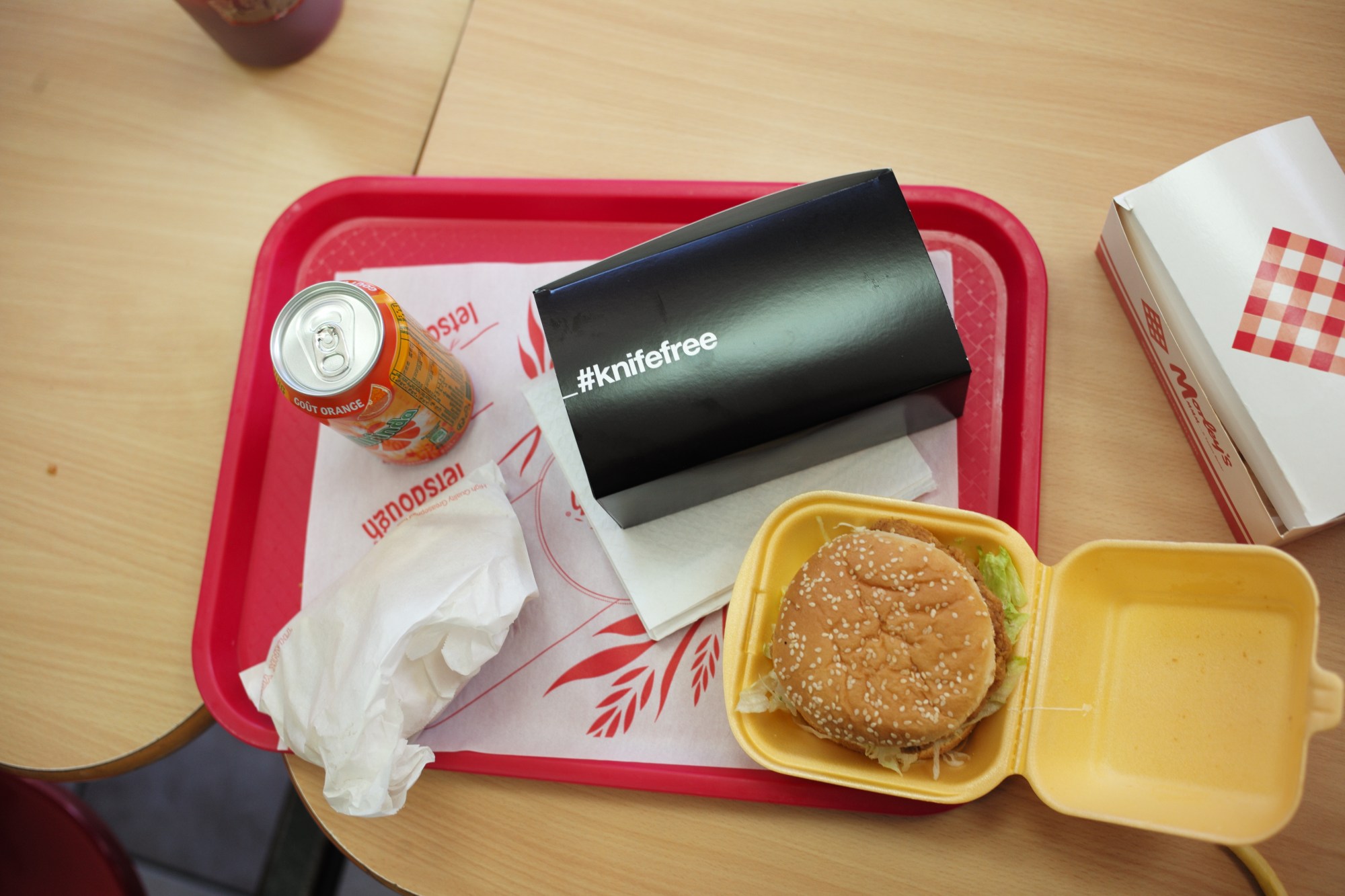In fulfilment of a routine that is more common than I’d like to admit, I’m sat in a Morley’s chicken shop on Brixton Road, South London — my local — peering over a cardboard box full of their famous spicy wings. It’s lunchtime, and the window behind me looks out onto a busy bus stop, lit up by the spring sun, as people walk by in both directions. The police station stands tall across the road. It’s the Easter holidays, so the chicken shop is full of customers of all ages, but no teenagers in uniform, as usually happens on weekdays during term time when local schools finish for the day. Over the course of an hour, men, women, and children alike queue up to order their food before leaving with white plastic bags full, or else they sit around in groups, couples or solo, enjoying their meal.
“It’s really good this place is trying to do something, at least, you know? Because it’s such an institution of the community. I’ve been coming here for decades,” says Dennis, a man in his forties sat across the table from me, who is wearing a baseball cap. I’ve asked him what he thinks of my chicken box, and handed it to him to inspect. This might sound like a strange thing to be doing, but my box is special: one of 20,000 that have been printed in all black, with #knifefree written in white on their lids, and distributed across various Morley’s shops in south London in recent weeks. (A busy store can go through over 1000 per-day.)
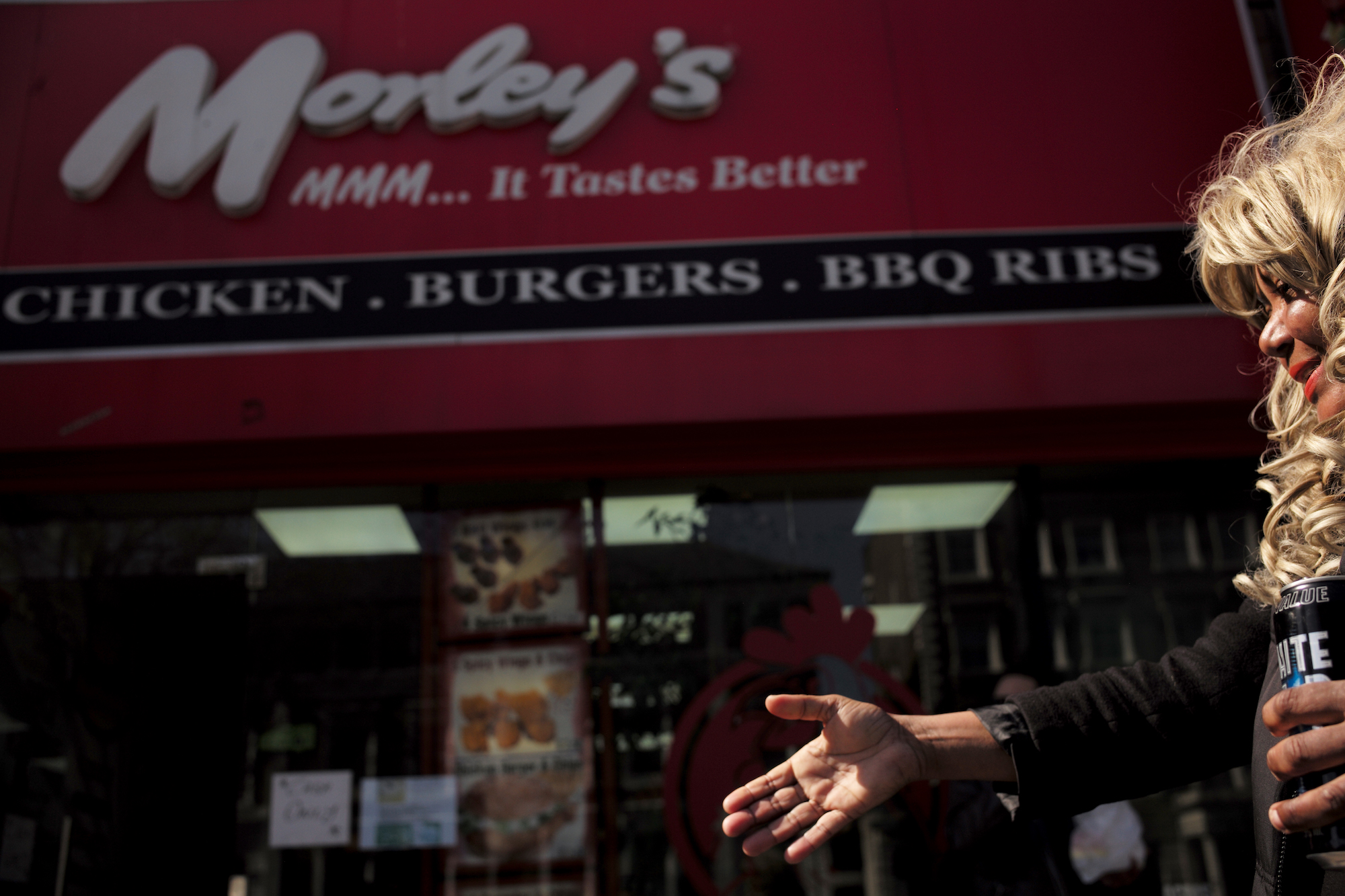
Inside the chicken box lid, readable to anyone sat ritualistically like I am, hunched over with one hand hidden in selection of another wing, is the title “Sean’s true story”, with chunks of text beneath it. The words explain how a young man, Sean, who used to habitually carry a knife, changed his life after someone he knew was stabbed and killed. It says he took up boxing after recognising he needed to find a new path. “Find out how to go knife free at knifefree.co.uk,” it concludes in suggestive optimism. The burger boxes share another story — that of Dean.
“I grew up around here and now I live in Kent, and you really notice what’s going on when you come back to the area. It’s always been dangerous, I knew people who got stabbed in the 90s. But in general, back then as kids you would just fight and move on with their lives. Now boys seem to think the only way of handling things is with a knife,” Dennis continues.
I have spent the last four years as a youth worker in various contexts across south London, from secondary schools to community centres, mentoring teenagers who are most at risk of social exclusion. And one of the fundamental truths I have come to realise is that the temptation among young people to carry a knife is becoming normalised in ways that are not obvious to adults. For many boys and young men especially, picking up a knife before leaving the house is like putting on shoes. And the trajectory of this trend is being driven upwards via several forces. One is simply that, as more stabbings take place, and more media headlines fill with the fierce sensationalism of tragedy, rather than the careful discussion of informed solutions or critical responses, for teenagers living in impoverished parts of the city it becomes harder to believe that public space is safe to spend time in without carrying a weapon. If more and more of one’s peers are carrying, talking and rapping about, and in the worst cases using knives, it stops becoming a bizarre idea to carry one, especially if one rationally fears for their life.
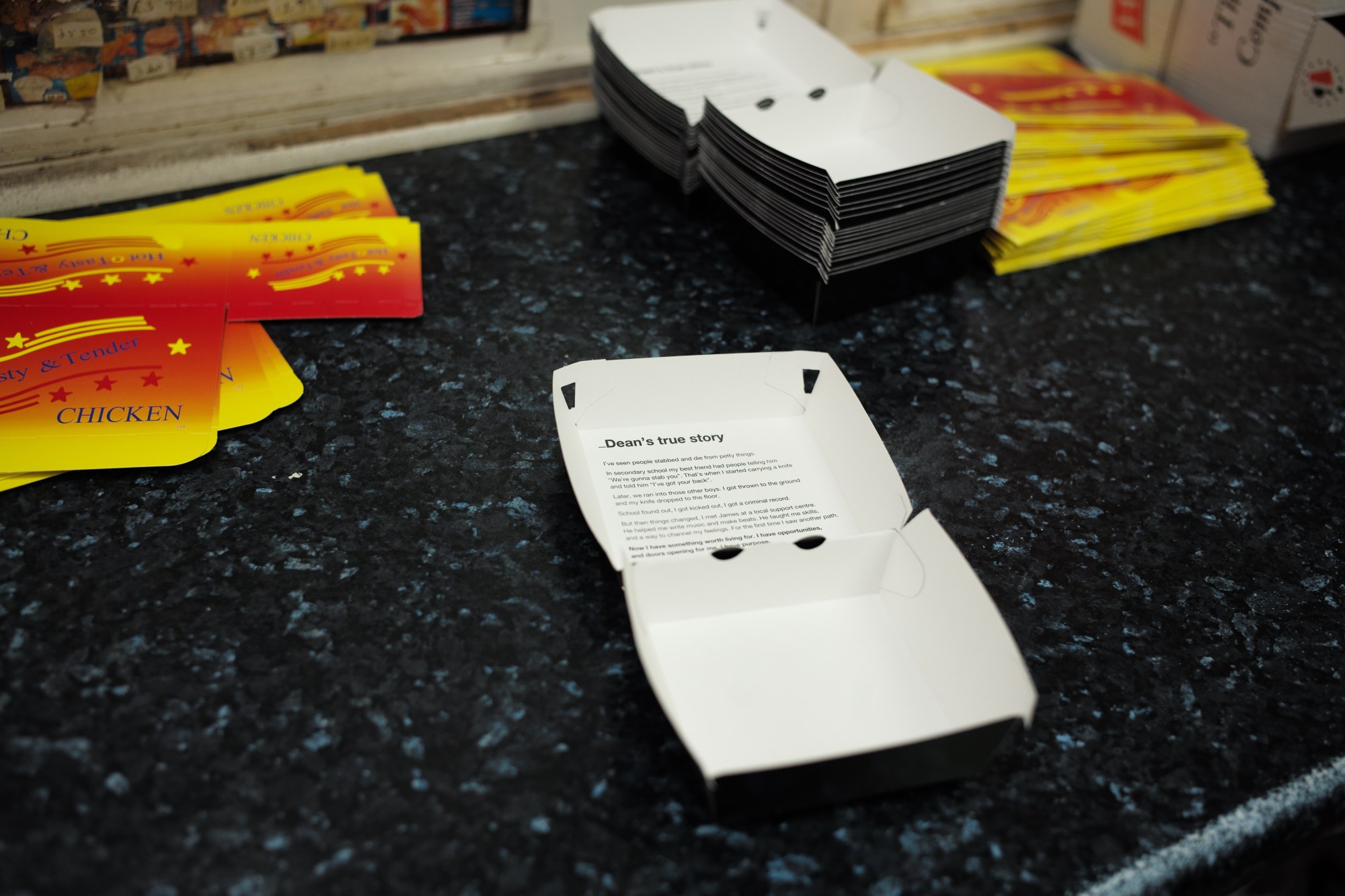
Another force undeniably at play is that, as public services — child mental health support, youth clubs, policing — are shredded by the state, a sense of isolation and insecurity has started to seep into the collective experience of urban communities at a higher rate than ever before. Young people, in turn, feel less protected, and more tempted to take matters into their own hands. From a youth-working angle, one of the main challenges of fighting this context and intercepting this tendency is getting at-risk young people to break unsafe or negative patterns in their lives, and leading them towards alternative, more constructive ways of protecting themselves and looking ahead to the future.
“What triggered all of this was when a teenage boy got stabbed to death outside our branch in Bellingham last year,” explains Shan Selvendran, Managing Director of Morley’s, when we speak on the phone. “I grew up in Bellingham; I live near there now, so it really hit home for me personally. I sat down and talked it through with my team and my family, and we realised we needed to provide a positive message in some way. From a positioning point of view, a lot of young people go to Morley’s. We know we are a pillar of the community in south London. We have a voice. And every business has to look at who their customer is: ours are mainly youngsters. So I felt we had a social responsibility to do something. The feedback from our social channels has been really positive, so we’re looking to get the boxes rolled out across more stores, and Chicken Cottage in Manchester is trialling them, too,” he says. “But think about bigger corporations… imagine if places like McDonalds and Burger King did this! With any luck they can learn from the example we are setting and do the same. This is not about keeping it at Morley’s, this is about giving back to a community that I have grown up in, and where Morley’s has grown up in as well,” he continues, personifying the brand that has become a much-loved institution for south Londoners over three decades (Selvendran’s father founded the company in 1985).
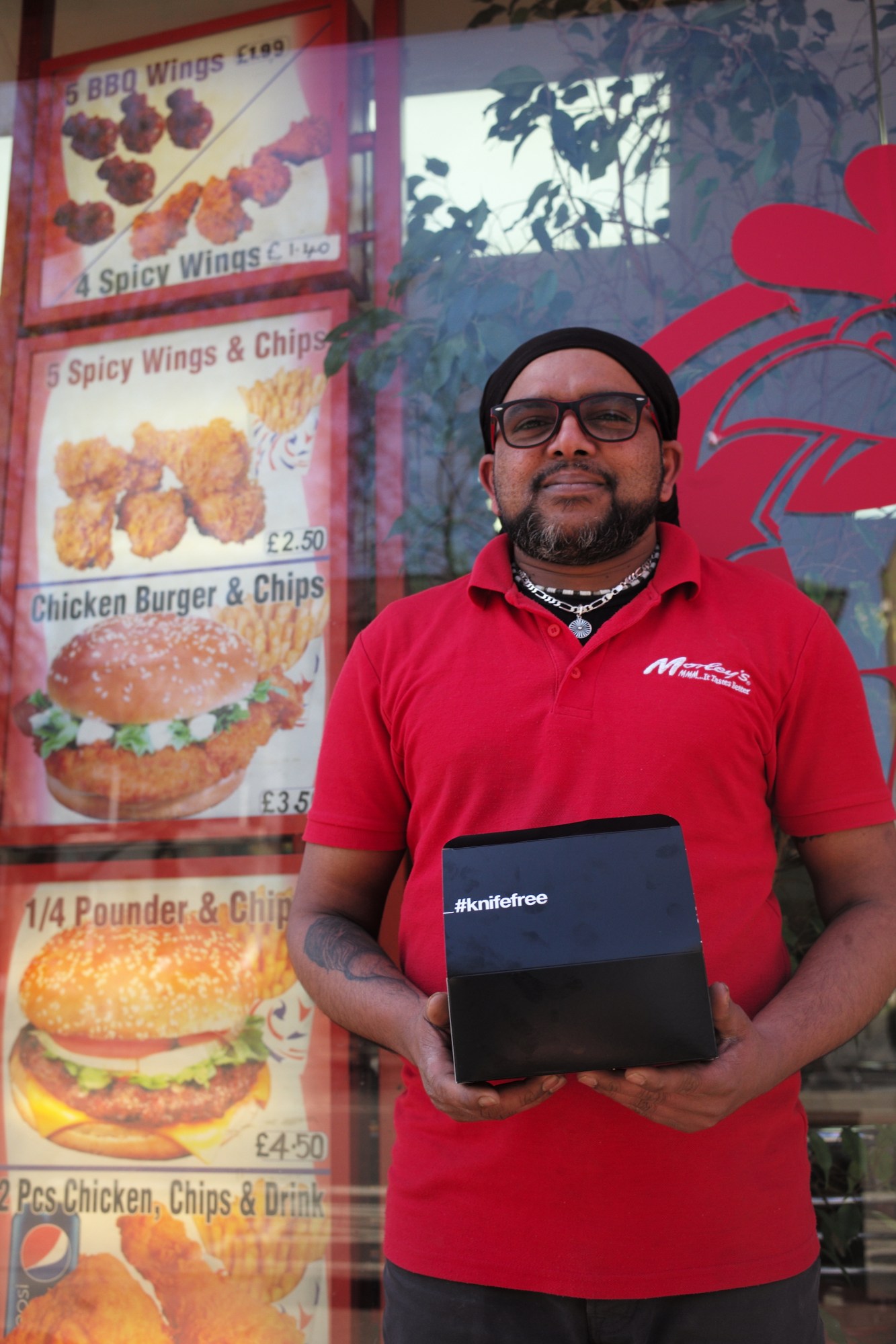
The new boxes are the result of Morley’s partnership with All City Media Solutions (ACMS), who specialise in reaching young and diverse audiences by placing screens in fast-food outlets. They are funded by the Home Office, whose #knifefree campaign has become a visible platform for subtly intercepting young people’s daily lives on advertising screens and through social media content, thus attempting to nudge those at risk of feeling the need to carry a knife to consider an alternative course of action and behavioural change. It would be disingenuous to claim that the boxes or the campaign are central solutions to the epidemic of knife violence that has crystallised in major cities across the UK in recent years. But they nonetheless represent the kind of innovative, community-led problem-solving that could help to spark critical conversations between young people in spaces they feel comfortable, where the norms of adolescence usually go unchallenged.
“We had to think strategically about working with the Home Office to get this positive messaging somewhere more than just our screens,” says Stephen Waller, Co-Founder of ACMS. He explains that the box idea is a form of “ambient” communication, which means the information is presented somewhere it usually wouldn’t be. “The great thing about a chicken shop is that the dwell time is huge,” he continues, referring to the amount of time consumers spend in front of an advert, “because you’re there ordering your food, waiting, and then eating it. The boxes simply add to that dwell time: they are unavoidable media.”
“In the two years I have worked here I’ve seen hundreds of knives” says Gayan, one of the staff members at Morley’s Brixton, when I ask if he thinks the boxes are necessary. Like many of the staff across Morley’s shops that are situated exclusively south of the River Thames, Gayan is a Sri Lankan Tamil. His long, dreadlocked hair is tied up as he wipes my table before posing for the camera. “Children come in after school, and you can sometimes see them outside holding knives. One tall young man used to come in here all the time, every five minutes. But now he is in a wheelchair because he was stabbed out on the street,” he continues, shaking his head and pointing out of the open door.
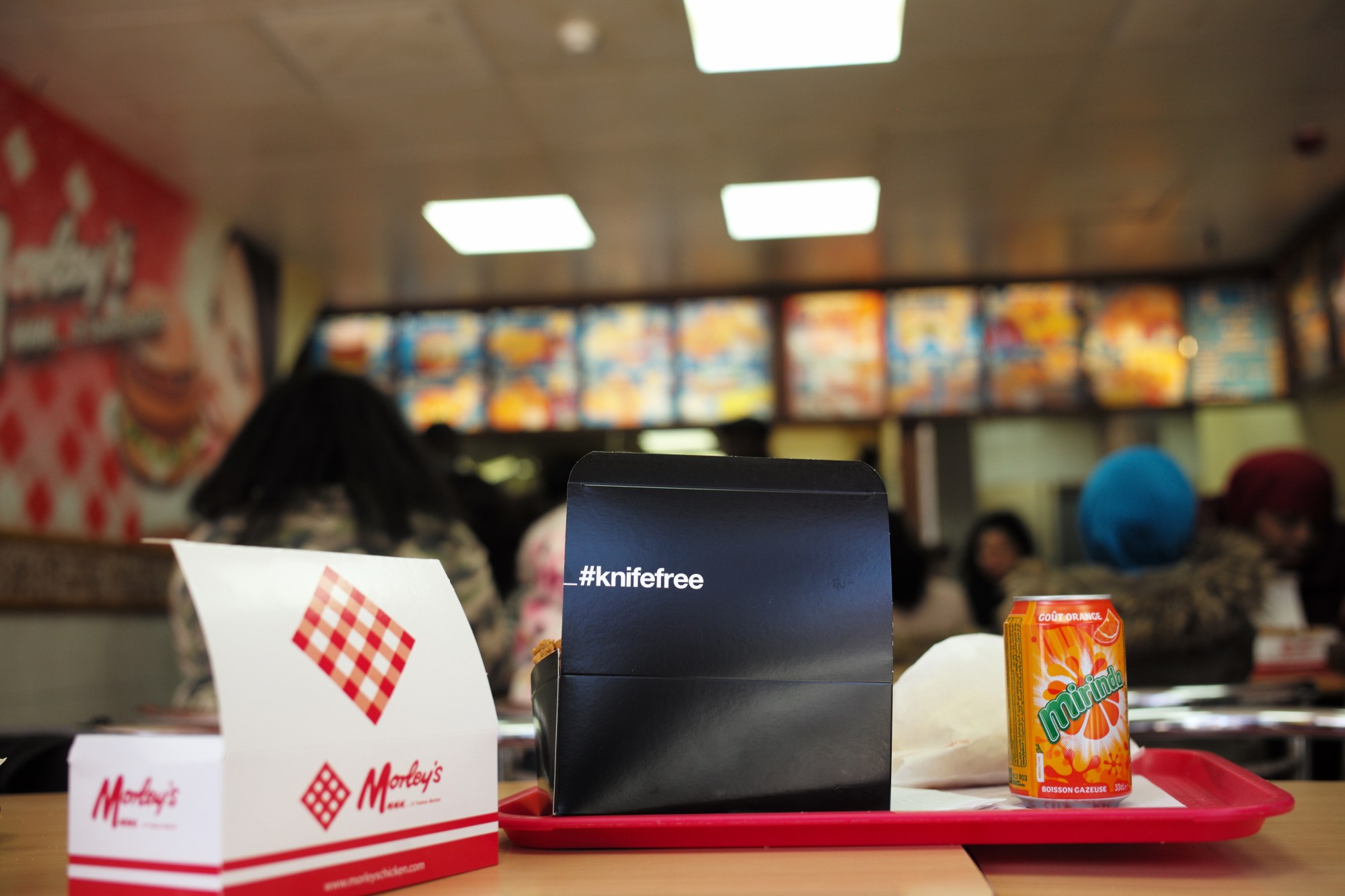
I get talking to an 18-year-old man, Alameen, who is dressed in a full-length dark blue tracksuit and wearing Apple Airpods as he walks past to leave the shop with his bag of lunch in hand. I hand him a burger box to look at, ask him what he thinks, and he frowns at the plain black outside. But on opening the lid to reveal Dean’s story, he smiles and his eyes light up. “Yeah this is hard. I didn’t expect there to be anything inside,” he says. “I think it’s good if younger boys can read about other people’s stories like this, it’s important to get a different perspective.”
As I stand up to leave and head to the counter to say goodbye to Gayan and the staff, I notice two young women eating chicken fillet burgers. I ask if they’d noticed what it said inside their burger boxes. Both of them start laughing self-consciously. “Oh my god I hadn’t noticed that!” one replies, pointing at the open lid. Do they think it will help?
“Yeah, I guess so, only if people notice them though,” one of them replies, shrugging her shoulders. “At the end of the day, it’s up to a person to make the decision to change themselves. I guess if the box can make them think harder and talk for a bit about it with their friends, then that can only be a good thing” she says. I grab a lemon hand wipe from the counter and leave them in peace to enjoy the rest of their meals.
